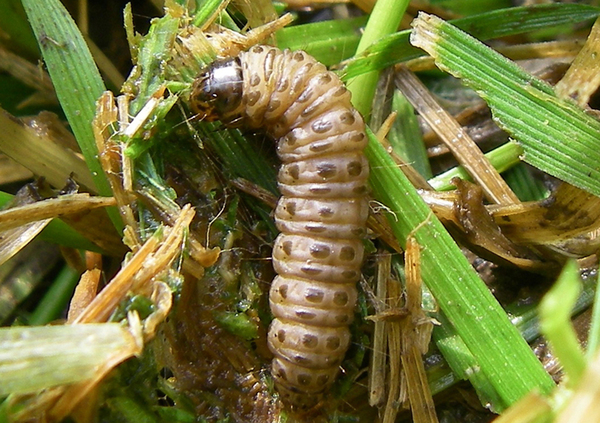What are Sod WEbworms?
There are many insects that are native to Florida, and one of the most damaging to new lawns is the sod webworm. In most years, damage from sod webworms becomes visible starting in June and continues through August. Learn more about this common insect and how to determine if your lawn is infested with sod webworms.

Identifying Sod Webworms
1. Look for moths when you walk through your lawn. If see little white moths flying up when you walk on the grass, that is a sure sign that there are sod webworms in your lawn. These moths are laying eggs that will soon become newly-hatched caterpillars. At first you may see very little actual damage to your grass, but as they become fully grown their feeding becomes more noticeable, sometimes so quickly that may seem like your lawn was decimated in one night.
2. Injured grass with notches chewed along the sides of the blades. Sod webworm damage often appears unevenly across the lawn, and foliage may be almost completely stripped off some in patches. These areas quickly succumb to the sod webworms, turning from healthy green to yellow or brown.
3. Sod webworms feed primarily at night and remain in a curled position at or near the soil surface during the day. Looking closely with a flashlight at night will often reveal the caterpillars as they are feeding on your grass.
4. In the summer months, inspect your lawn weekly to look for sod webworms and the damage they cause.
5. An effective way to survey your yard for sob webworms is by using the soap flush technique. Mix dishwashing detergent at a rate of 1.5 fluid ounces per two gallons of water for each 4′ X 4′ area you want to inspect. Saturate the first area with this solution and carefully observe the surface for about two minutes. If sob webworms are present, they will emerge on the grass surface where you can easily detect them. If no insects are found in the first area, examine at least three or four other places in areas you suspect sod webworms may be damaging your lawn.
Controlling Sod Webworms
We recommend using Acelepryn or Merit Insecticides to help control and prevent sod webworms in lawn grasses.
If you believe you may have sod webworms in your lawn, we recommend using a professional landscape contractor who is licensed to spray for insects to treat your lawn. Give us a call at any local Woerner Landscape Source and we can give you recommendations on professional landscape services in your area.
